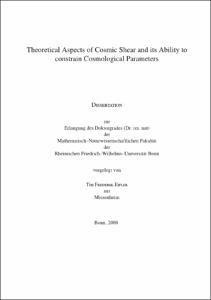Eifler, Tim Frederik: Theoretical Aspects of Cosmic Shear and its Ability to constrain Cosmological Parameters. - Bonn, 2009. - Dissertation, Rheinische Friedrich-Wilhelms-Universität Bonn.
Online-Ausgabe in bonndoc: https://nbn-resolving.org/urn:nbn:de:hbz:5N-16908
Online-Ausgabe in bonndoc: https://nbn-resolving.org/urn:nbn:de:hbz:5N-16908
@phdthesis{handle:20.500.11811/4045,
urn: https://nbn-resolving.org/urn:nbn:de:hbz:5N-16908,
author = {{Tim Frederik Eifler}},
title = {Theoretical Aspects of Cosmic Shear and its Ability to constrain Cosmological Parameters},
school = {Rheinische Friedrich-Wilhelms-Universität Bonn},
year = 2009,
month = mar,
note = {In the last decade weak gravitational lensing by the large-scale structure of the Universe, also called cosmic shear, has become an important tool to constrain cosmological parameters. Despite this success there remain observational and theoretical issues which must be solved to fully investigate the cosmological information of future cosmic shear data. In this PhD thesis I address several of these issues.
As a first project I use ray-tracing simulations to compare and optimize cosmic shear data vectors. More precisely, I develop a new data vector by combining two cosmic shear measures, namely the aperture mass dispersion (2ap>) and the two-point correlation function (2PCF). The new data vector has higher information content than a 2ap> data vector and is more robust against contamination compared to a 2PCF data vector. In my second project on cosmic shear measures I examine the ring statistics, which is the most recently developed cosmic shear measure. The ring statistics improves on deficits in the E- and B-mode decomposition of commonly used cosmic shear measures, e.g. the aperture mass dispersion. I optimize the signal strength of the ring statistics, develop an expression for its covariance, and compare its information content to that of the aperture mass dispersion. I find that the ring statistics' data points are less correlated and that a ring statistics' data vector contains more information on cosmological parameters. Finally, I employ the ring statistics to measure a cosmic shear signal from data of the Canada-France-Hawaii Telescope Legacy Survey and constrain cosmological parameters. As a result I obtain s8 (Om / 0.25)= 0.82+0.02-0.04.
As a third project I examine cosmic shear covariances and their impact on cosmological parameter constraints. Using simulated data I investigate the cosmology-dependence of these covariances and develop improved methods for a likelihood analysis, which take the cosmology-dependence into account. In addition to the cosmology-dependence, I examine how the shear fields' non-Gaussianity affects cosmic shear covariances and the parameter constraints (in particular for dark energy parameters). I quantify the impact of non-Gaussianity as a function of angular scale and derive a fit-formula for the calculation of non-Gaussian covariances from Gaussian ones.},
url = {https://hdl.handle.net/20.500.11811/4045}
}
urn: https://nbn-resolving.org/urn:nbn:de:hbz:5N-16908,
author = {{Tim Frederik Eifler}},
title = {Theoretical Aspects of Cosmic Shear and its Ability to constrain Cosmological Parameters},
school = {Rheinische Friedrich-Wilhelms-Universität Bonn},
year = 2009,
month = mar,
note = {In the last decade weak gravitational lensing by the large-scale structure of the Universe, also called cosmic shear, has become an important tool to constrain cosmological parameters. Despite this success there remain observational and theoretical issues which must be solved to fully investigate the cosmological information of future cosmic shear data. In this PhD thesis I address several of these issues.
As a first project I use ray-tracing simulations to compare and optimize cosmic shear data vectors. More precisely, I develop a new data vector by combining two cosmic shear measures, namely the aperture mass dispersion (
As a third project I examine cosmic shear covariances and their impact on cosmological parameter constraints. Using simulated data I investigate the cosmology-dependence of these covariances and develop improved methods for a likelihood analysis, which take the cosmology-dependence into account. In addition to the cosmology-dependence, I examine how the shear fields' non-Gaussianity affects cosmic shear covariances and the parameter constraints (in particular for dark energy parameters). I quantify the impact of non-Gaussianity as a function of angular scale and derive a fit-formula for the calculation of non-Gaussian covariances from Gaussian ones.},
url = {https://hdl.handle.net/20.500.11811/4045}
}






